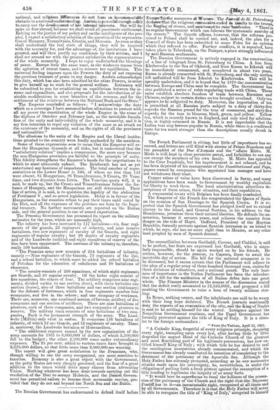The Russian Government has endeavoured to defend itself before Europelorethe
massacres At Warsaw. The Journal de St. Petersbourg decrlares-fliat the religious cesemonies ended in insults to the troops, the tinging of stones, and airattempten raise barricades. " There's no regular Government whi6h can tolerate the-systematic anarchy ot the streets." The Gazette affirms, however, that the reforms pro. mised to Poland shall be carried out, and, indeed, the plan for a Council of State has been submitted to some Poles for an -opinion which they refused to offer. Further conflicts, it is reported, have taken place in Teherkask, on the Dnieper, a place strongly influenced by anti-Russian sentiments. The Russian Government is actively engaged in the construction of a line of telegraph from St. Petersburg to China. A line from Khaberooka to the Sea of Okhotsk, and from Kasen to Irkutsk will be immediately conuneneed, and completed in about two years. Kasen is already connected with St. Tetersbnrg, and the only section left unfinished will be from Irkutsk to Kitaberooka. This will be speedily undertaken, and it is hoped that by 1870 the communication between Europe and China may be complete. The Government has also published a series of rules regulating trade with China. These rules establish absolute freedom of trade between Russians and Chluese,subject.to certain duties on tea brought overland. Only tea appears to be subjected to duty. Moreover, the importation of tea is permitted at all Rnssian ports subject to a duty of thirty-five copecks the Russian poundlor -the teas of commerce, and-sixty-five copecks for the teas in blossom, black, green, and yellow. Yellow tea, which is scarcely known in England, and only used for adaltera- tion, is highly esteemed in Rumia. It is not improbable that the Indian teas may become popular in Russia, while there is a confirmed taste for tea much stronger than the descriptions usually drunk in Europe.






























 Previous page
Previous page